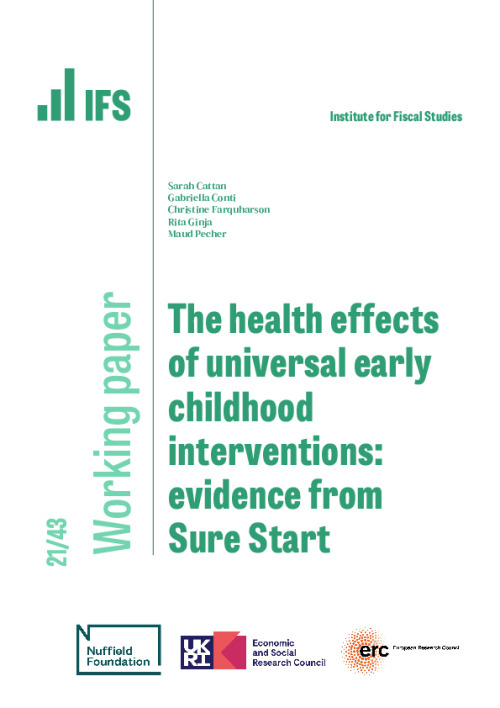We evaluate the short- and medium-term heath impacts of Sure Start, a large-scale and univer-sal early childhood program in England. We exploit the rollout of the program and implement a difference-in-difference approach, combining data on the exact location and opening date of Sure Start centers with administrative data on the universe of admissions to public-sector hospitals. Exposure to an additional Sure Start center per thousand age-eligible children increases hospitalization by 10% at age 1 (around 6,700 hospitalizations per year), but reduces them by 8-9% across ages 11 to 15 (around 13,150 hospitalizations per year). These findings show that early childhood programs that are less intensive than small-scale ‘model programs’ can deliver significant health benefits, even in contexts with universal healthcare. Impacts are driven by hospitalizations for preventable conditions and are concentrated in disadvantaged areas, suggesting that enriching early childhood environments might be a successful strategy to reduce inequalities in health.
Authors


Research Fellow University College London
Gabriella is a Research Fellow of the IFS and a Professor of Economics in the Department of Economics and in the Department of Social Science at UCL.

Research Associate University of Bergen
Rita is an IFS Research Associate, an Associate Professor at the University of Bergen and a Research Associate at the Uppsala University.

Associate Director
Christine's research examines inequalities in children's education and health, especially in the early education and childcare sector.

Maud Pecher
Working Paper details
- DOI
- 10.1920/wp.ifs.2021.2521
- Publisher
- Institute for Fiscal Studies
Suggested citation
Cattan, S et al. (2021). The health impacts of universal early childhood interventions: evidence from Sure Start. London: Institute for Fiscal Studies. Available at: https://ifs.org.uk/publications/health-impacts-universal-early-childhood-interventions-evidence-sure-start (accessed: 30 June 2024).
Grant
More from IFS
Understand this issue

Sure Start achieved its aims, then we threw it away
15 April 2024

What is the two-child limit in benefits?
27 June 2024

Liberal Democrat manifesto: a reaction
10 June 2024
Policy analysis

How do the last five years measure up on levelling up?
19 June 2024

Free breakfast clubs in schools: what Labour’s plans would mean for pupils and families
25 June 2024

Labour’s plans to build childcare spaces in schools will nudge the market in a different direction – but not transform it
9 June 2024
Academic research

The intergenerational elasticity of earnings: Exploring the mechanisms
3 June 2024

Economics of Childhood Nutrition Workshop

Targeting men, women or both to reduce child marriage
28 May 2024
